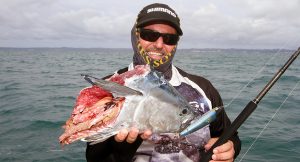SHARK! It’s a word that can evoke a visceral response in many people. Rather like “snake” or “crocodile”. I’ll never forget a line in one of comedian Vince Sorrenti’s stand-up routines when he theorised that the name “shark” was actually coined by the first person to sight that trademark triangular fin slicing through the water towards them. In a blind panic, they tried to shout “sh*t!” and “f*ck!” at the same time, and it came out as “SHARK”. He might be onto something, too!
But seriously, reports of shark attacks on humans — both fatal and non-fatal — always create major headlines, even if half a dozen or more people died on our roads the same day, or in accidents around the home and on work sites. The media has a macabre fascination with hapless humans being torn apart by a wild animals and, to be fair, so do we, as consumers of that media.

Cue the “Jaws” theme! Starlo snapped this underwater image of a very large white pointer more years ago than he cares to remember, while hanging out through the transom door of a game boat.
Of course, any shark attack is a tragedy, and fatal encounters can totally devastate families and even entire communities, leaving trauma that may linger for years. But the truth is, these attacks on humans remain blessedly rare, especially considering the vast (and growing) number of people who enter the water each day to play, work or fish.
It’s claimed that around 70 shark attacks occur globally each year, with perhaps a dozen or so of those resulting in fatalities, although under-reporting in third world countries probably means that the real figure is higher. By contrast, some estimates claim that as many as 63 million sharks are killed globally each year by commercial fishing fleets alone. A significant additional number are also taken by the recreational sector. A lot of these sharks are eaten, while others are simply discarded as unwanted by-catch. Either way, I guess it’d be reasonable to say that “man bites shark” at least a million times more often than “shark bites man”.

Not necessarily what you want to see, particularly if you have a good fish on the line
I made a post about this subject recently on Facebook, and I was particularly interested in hearing the various opinions on sharks as table fare. I’ve eaten quite a few over the years, and I’m left with mixed impressions. Some (like gummies) are almost always very tasty, particularly if handled and processed properly after capture (meaning thoroughly bled-out and iced).
Directly as a result of that post a mate gave me some fresh wobbegong shark to try — something I’d never eaten before, at least not knowingly. The result was interesting. My wife Jo and daughter Amy absolutely loved the wobby “cocktail bites” I made: shallow fried in a light coating of egg and panko bread crumbs. Both came back for seconds. To be honest, I was a little more ambivilent. The taste was fine, but I found the texture or “mouth feel” somehow disconcerting. I couldn’t quite put my finger on what it was that I didn’t enjoy, but it reinforced to me just how important texture is in matters of culinary taste.

This is usually about when the tax man cometh!
Personal preferences aside, there’s no denying that many sharks do make great tucker. There’s a reason that good ol’ “flake” (usually gummy or school shark) has been a fish-and-chip shop staple in our southern states since Jesus played fullback for Jerusalem.
Of course, no discussion of sharks would be complete without mention of the increasingly topical subject of “shark depredation”, which is the fancy term for having your prize catch “taxed” by the men in grey overcoats before you can get it into the boat. This is becoming a huge and often controversial issue in recreational fishing: from the marlin waters of the outer Ribbon Reefs, to the tuna schools of Hervey Bay, and the deep-drop marks off Exmouth. A lot of fish are being lost to sharks every year, both pre-landing and post-release.

That hurts! (Photo courtesy of Scott Mitchell.)
Shark depredation is a very serious issue, and it only appears to be getting worse. Apart from anything else, it significantly increases the true “harvest” or take of fish by both the commercial and recreational sectors, without supplying any benefit to either group. I also suspect it’s only a matter of time until fisheries managers start factoring this into quotas and total allowable catches, if they haven’t already begun doing so.
This growing shark problem is no doubt the result of a combination of factors. Many sharks have clearly “learnt” to follow boats and key in on fishing activities. There’s also sound reason to suspect that populations of certain species (particularly some of the whalers) have either increased or rebounded due to changes in commercial fishing practices, along with the creation of no-take zones, plus tighter catch and gear limits. All this can be overlaid with climate change, which is seeing warmer water present for more of the year at many latitudes. It’s a perfect storm.
What to do about it remains the big question. Many in the fishing industries (both commercial and recreational) are calling for a “cull” of sharks. Not surprisingly, that’s going over like a lead balloon with conservationists and the broader public. It’s not a good look to call for the mass killing of just about anything, let alone sharks, which have received something of a media make-over in recent years and are often portrayed these days as heavily-exploited and on even the brink of extinction.

Well, that’s one answer! Maybe not ideal, though.
In truth, it’s a bit more complicated than that. It usually is! Some shark species (makos, threshers, certain types of hammers and so on) are in serious decline, while numbers of many other species are clearly booming, due at least in part, as already mentioned, to human activity. But calling for a shark kill is a bit like looking at huge mobs of grey and red kangaroos grazing in a paddock and saying that the macropods are clearly in “plague proportions” and need culling. This ignores the plight of genuinely endangered marsupials like the black-flanked rock-wallaby, Gilbert’s potoroo, golden-mantled tree-kangaroo and so on.
Things are rarely black and white. The whole shark question requires a degree of nuance that’s no longer common in a world of 10 second sound bites and throwaway social media posts. However, as fishers, we do ourselves no favours at all by calling for some kind of shark holocaust. When the non-fishing public hear demands for a cull, they simply label us as all anti-conservation rednecks. Once we’re branded that way, we lose a lot of our lobbying power and our social licence. It’s hard to win those things back.
A better answer might be to talk up the edibility of many of the more prolific shark species and promote their nutritional and culinary values, thus promoting more consumption and increased commercial pressure (within strict controls, of course). It might be an instance where “man bites shark” actually works out for the better.
Tight Lines.
![]()

Steve (Starlo) Starling is an Australian sports fishing writer and television personality who has appeared in many of Rex Hunt’s Fishing Adventure programs on the Seven Network.
He has published twenty books on the subject of angling, as well as thousands of magazine articles.
Starlo has scripted and presented many instructional videos and DVDs, and been a Researcher and on-screen presenter for a number of Australian angling and outdoor television programs.
Follow Starlo Gets Reel on Youtube for some of the best, educational and most entertaining fishing viewing on-line.
Click on the banner below for a direct link to the Channel.








